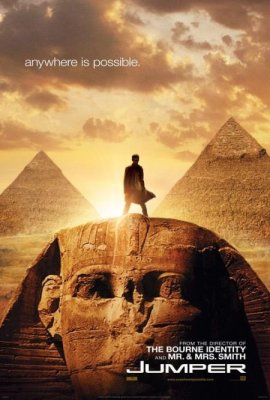
A publishing industry professional told me last summer the time travel market was "soft." This was before Journeyman, well into the throwes of Lost and Heroes's successful record, and a breath before the current run of television and movie releases involving time travel. With the exception of about ten years ago, circa Quantum Leap-era, I can't recall a more fertile time for the topic, nor a time where the subject has become so mainstream. What about this media saturation is "soft"?
Does the book industry follow trends or create them? Sure, the Time Traveler's Wife came out in 2004 as a little-known literary novel. With no way to know it would be made into a major motion picture, I can't help but think the merit of the novel was based purely on Audrey Niffenegger's brilliant prose instead of the plot device usually relegated to the part of the bookstore where creepy men in Member's Only jackets browse.
By the time the publishing industry catches up with the "time thriller" trend, will readers and audiences be firmly in the been-there, done-that arena?
 Although the upcoming movie "Jumper" relies more heavily on the idea of teleportation--in itself time travel--it puts the marriage of paranormal and thriller at the forefront of high-profile media. Does this mean we're reaching the saturation point? The pinnacle of the trend?
Although the upcoming movie "Jumper" relies more heavily on the idea of teleportation--in itself time travel--it puts the marriage of paranormal and thriller at the forefront of high-profile media. Does this mean we're reaching the saturation point? The pinnacle of the trend?
My first novel was a fictional YA novel set aboard the Titanic. When I began researching it, it was an obscure topic that fascinated a small group of my students to the point where I couldn't find enough non-fiction books to satiate their curiosity. The last surviors were dying. Unbenownst to me, James Cameron was pouring a small Hollywood fortune into deep-sea expeditions that would eventually become the pinnacle of this trend. The sheer magnitude and success of his film saturated the market and made publishers reluctant to offer a contract to anything seen as a copycat.
Twice now, I've been a year or more ahead of a trend and watched other projects rise to the top, while publishing houses wait for a "sure thing". A time-tested subgenre that will guarantee sales, but leave them scrambling behind the trends of the mass media. Editors are reluctant to take chances, as one misstep could cost them their job. They walk a tightrope between fresh and proven, sales and art, where timing becomes everything.
If only they had the time-travel abilities of the stories they're so reluctant to stand behind.
What trend waves have you ridden in your work?
Even though I began writing my "Jane" book in 2004, it seems the Austen wave has hit an all-time high in the past year or two. And I thought I'd been so original :).